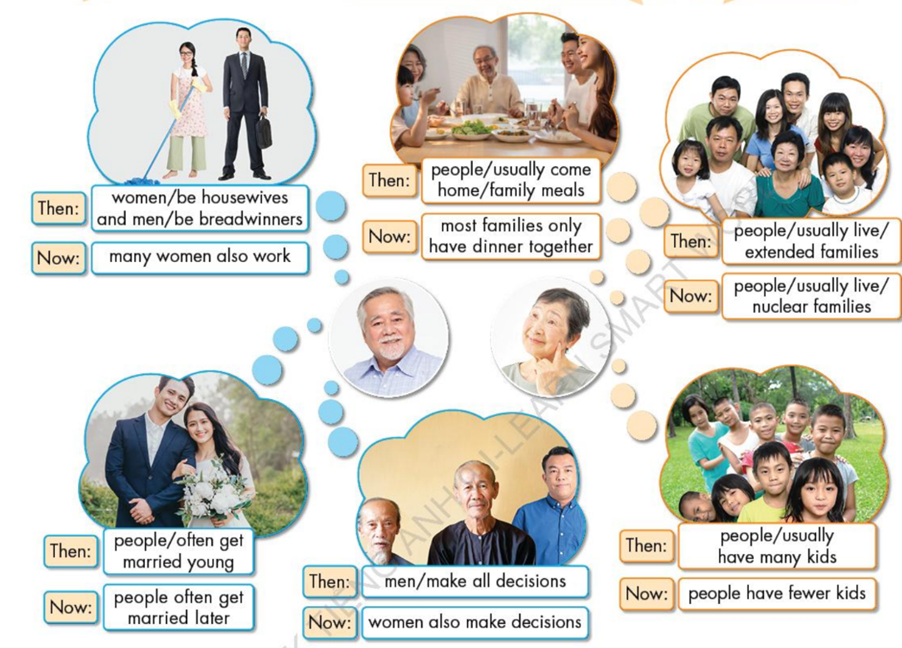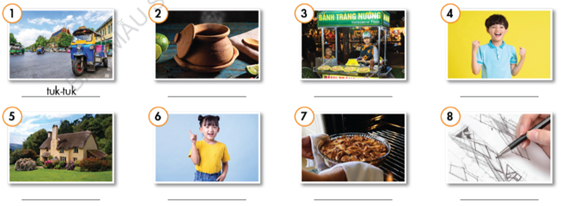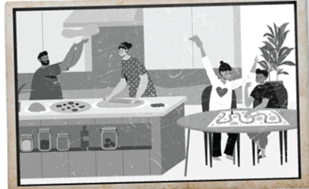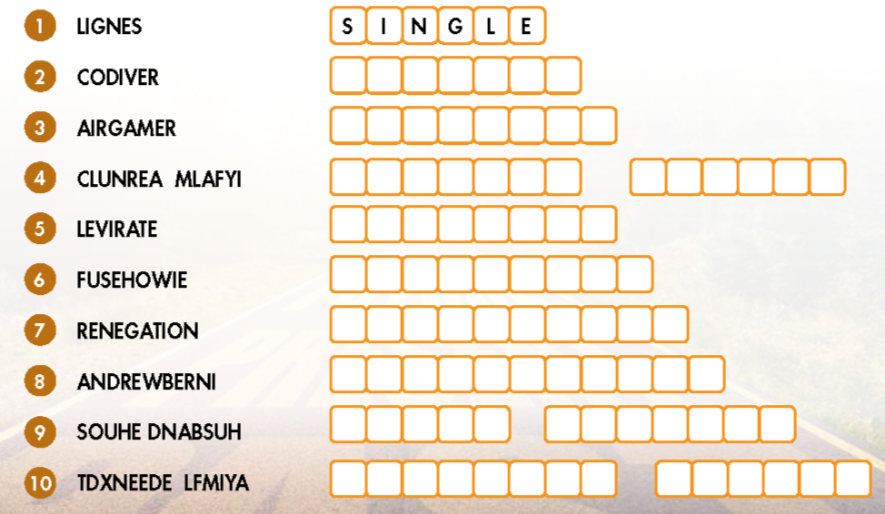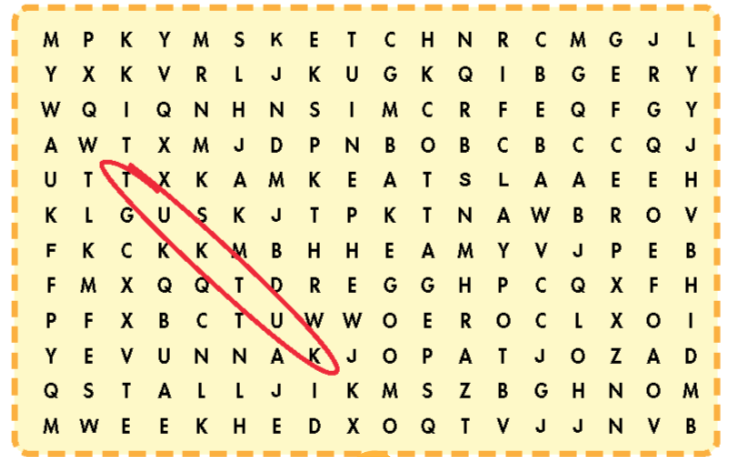Giải SGK, SBT Unit 2. Life in the past iLearn Smart World
Giải SGK, SBT Unit 2 iLearn Smart World
a. Match the underlined words with the definitions. Listen and repeat.
(Phù hợp các từ được gạch chân với các định nghĩa. Nghe và lặp lại.)
|
1. My family is a nuclear family. I live with my parents and sisters. (Gia đình tôi là gia đình hạt nhân. Tôi sống với bố mẹ và các chị gái.) |
a. the relationship between two people married to each other (mối quan hệ giữa hai người kết hôn với nhau) |
|
2. Tết is the only time I see all my relatives. My aunts and uncles don't live near us. (Tết là dịp duy nhất tôi được gặp tất cả người thân của mình. Các cô chú của tôi không sống gần chúng tôi.) |
b. a family including only parents and children (một gia đình chỉ có cha mẹ và con cái) |
|
3. Many young women prefer to be single. They don't want to get married. (Nhiều phụ nữ trẻ thích sống độc thân. Họ không muốn kết hôn.) |
c. a family including parents, children, aunts, uncles, grandparents, etc. (một gia đình bao gồm cha mẹ, con cái, cô, chú, ông bà, v.v.) |
|
4. My friend lives with her extended family. She lives with her parents, grandparents, aunts, and uncles. (Bạn tôi sống với đại gia đình của cô ấy. Cô sống với bố mẹ, ông bà, cô dì chú bác.) |
d. all the people of about the same age in a family or a society (tất cả những người cùng độ tuổi trong một gia đình hoặc một xã hội) |
|
5. Many men don't like being a house husband. They think men should earn money for the family. (Nhiều người đàn ông không thích làm chồng ở nhà. Họ cho rằng đàn ông nên kiếm tiền nuôi gia đình.) |
e. a member of your family (Một thành viên của gia đình bạn) |
|
6. My grandpa says my generation doesn't work hard, and people my age just want easy jobs. (Ông tôi nói rằng thế hệ của tôi không làm việc chăm chỉ và những người ở độ tuổi của tôi chỉ muốn những công việc dễ dàng.) |
f. the person in a family earning money to support the family (người trong gia đình kiếm tiền để nuôi sống gia đình) |
|
7. She became the breadwinner and worked to take care of her family. (Cô trở thành trụ cột và làm việc để chăm sóc gia đình.) |
g. end the relationship between a husband and a wife by an official process (chấm dứt quan hệ vợ chồng bằng thủ tục chính thức) |
|
8. My cousin is in a happy marriage with his wife. (Anh họ tôi đang có một cuộc hôn nhân hạnh phúc với vợ anh ấy.) |
h. not married or not in a relationship with someone (chưa kết hôn hoặc không có mối quan hệ với ai đó) |
|
9. My uncle is getting divorced. His wife doesn't want to be with him anymore. (Chú tôi sắp ly hôn. Vợ anh không muốn ở bên anh nữa.) |
i. a married woman staying at home and doing housework (một người phụ nữ đã có gia đình ở nhà và làm việc nhà) |
|
10. My grandma was a housewife. She took care of the family and didn't have a job after getting married. (Bà tôi là một bà nội trợ. Cô ấy phải chăm sóc gia đình và không có việc làm sau khi kết hôn.) |
j. a married man staying at home and doing housework (một người đàn ông đã có vợ ở nhà và làm việc nhà) |
b. Now, read and circle True, False, or Doesn't say.
(Bây giờ, đọc và khoanh vào True, False, hoặc Doesn’t say)
|
|
True |
False |
Doesn’t say |
|
1. All of Mrs. Nguyễn's children still live with her. (Tất cả các con của bà Nguyễn đều vẫn sống với bà.) |
|
|
|
|
2. She says having fewer people living together sometimes affects family connections. (Cô ấy nói việc có ít người sống cùng nhau đôi khi ảnh hưởng đến mối quan hệ gia đình.) |
|
|
|
|
3. In the past, most men weren't single. (Trước đây, hầu hết đàn ông không độc thân.) |
|
|
|
|
4. Mrs. Nguyễn thinks being a single parent now isn't a good thing. (Bà Nguyễn cho rằng bây giờ làm mẹ đơn thân không phải là điều tốt.) |
|
|
|
|
5. She says men went to work, and women did the housework in the past. (Cô ấy nói trước đây đàn ông đi làm, còn phụ nữ làm việc nhà.) |
|
|
|
d. Write sentences using the information in the table with either used to (if there's no past time phrase) or would (if there's a past time phrase).
(Viết câu sử dụng thông tin trong bảng với used to (nếu không có cụm từ quá khứ) hoặc will (nếu có cụm từ quá khứ).
|
Person (Người) |
Past (Quá khứ) |
Now (Hiện tại) |
|
Me (tôi) |
live in Tokyo (sống ở Tokyo) |
live in Madrid (sống ở Madrid) |
|
Sister (chị gái) |
work in a market stall (làm việc ở gian hàng chợ) |
work in a bookstore (làm việc ở cửa hàng sách) |
|
Me (tôi) |
do arts and crafts in the yard when I was little (làm nghệ thuật và thủ công trong sân khi tôi còn nhỏ) |
do arts and crafts inside (làm nghệ thuật và thủ công trong nha) |
|
Me (tôi) |
have a dog called Twiglet (có một con chó được gọi là Twiglet) |
have a cat called Grant (có một con mèo được gọi là Grant) |
|
Brother (em trai) |
travel to the beach every summer back then (hồi đó đi du lịch biển vào mỗi mùa hè) |
travel to the city in the summer (du lịch đến thành phố trong mùa hè) |
b. Choose two or three events or memories and complete the table with information about what, how, and when they happened.
(Chọn hai hoặc ba sự kiện hoặc kỷ niệm và hoàn thành bảng với thông tin về cái gì, như thế nào và khi nào chúng xảy ra.)
|
Family members |
|
|
Event/Memory 1 |
|
|
Event/Memory 2 |
|
|
Event/Memory 3 |
|
You will hear a girl, Lucy, and her mom talking about family customs in the past. Listen and fill in the blanks. You will hear the conversation twice.
(Bạn sẽ nghe thấy một cô gái, Lucy và mẹ cô ấy nói về phong tục gia đình ngày xưa. Nghe và điền vào chỗ trống. Bạn sẽ nghe cuộc trò chuyện hai lần.)
Family customs in the past
|
Lucy’s grandmother was: |
0 |
a housewife |
|
Her mom used to work at: |
1 |
______________________________________________ |
|
Her mom has: |
2 |
ten _____________________ |
|
Not many people would get: |
3 |
______________________________________________ |
|
To raise kids, women needed a man to: |
4 |
______________________________________________ |
|
Her mom thinks people used to be more willing to: |
5 |
___________________ together |
b. Now, listen and circle True or False.
(Bây giờ, hãy nghe và khoanh tròn Đúng hoặc Sai.)
|
1. Freddie's grandpa used to live on a farm with his parents. (Ông nội của Freddie từng sống ở một trang trại với bố mẹ anh.) |
True (Đúng) |
False (Sai) |
|
2. He didn't grow vegetables on the farm. (Anh ấy không trồng rau ở trang trại.) |
True (Đúng) |
False (Sai) |
|
3. Freddie's grandma was a housewife. (Bà của Freddie là một bà nội trợ.) |
True (Đúng) |
False (Sai) |
|
4. She wasn't a very good cook. (Cô ấy không phải là một người nấu ăn giỏi.) |
True (Đúng) |
False (Sai) |
|
5. Freddie's grandparents moved into town when they got old. (Ông bà của Freddie chuyển đến thị trấn khi họ già.) |
True (Đúng) |
False (Sai) |
Writing Skill
|
Using time connectors (Sử dụng từ dùng để kết nối thời gian) To show when an event happened in relation to another event, we can use afterwards, meanwhile, and eventually. We often use them at the beginning of a sentence (with a comma after) or before the main verb*. (Để chỉ ra thời điểm một sự kiện xảy ra có liên quan đến một sự kiện khác, chúng ta có thể sử dụng afterwards, meanwhile, và eventually. Chúng ta thường sử dụng chúng ở đầu câu (có dấu phẩy sau) hoặc trước động từ chính.) • Afterwards: at a later time (Sau đó: vào một thời điểm sau đó) He worked at the store for several years. Afterwards, he opened his own store. (Anh ấy đã làm việc ở cửa hàng này được vài năm. Sau đó, anh mở cửa hàng riêng của mình.) • Meanwhile**: at the same time something else is happening (Trong khi đó: cùng lúc đó có điều gì đó khác đang xảy ra) Her husband fought in the war. She meanwhile had to raise five kids on her own. (Chồng cô đã chiến đấu trong chiến tranh. Trong khi đó, cô phải một mình nuôi 5 đứa con.) • Eventually: in the end, after a long time (Cuối cùng: cuối cùng, sau một thời gian dài) He walked to work for years to save money. Eventually, he got enough money to buy a bicycle. (Anh ấy đã đi bộ đi làm trong nhiều năm để tiết kiệm tiền. Cuối cùng, anh ấy đã có đủ tiền để mua một chiếc xe đạp.) *Using afterwards before the main verb is only common in formal language. (Việc sử dụng aftewards trước động từ chính chỉ phổ biến trong ngôn ngữ trang trọng.) **We can also use a comma before and after meanwhile if we want to contrast two things or people. * (Chúng ta cũng có thể sử dụng dấu phẩy trước và sau meanwhile khi muốn đối chiếu hai sự vật hoặc hai người.) His family was rich. She, meanwhile, came from a poor family. (Gia đình anh rất giàu có. Trong khi đó, cô xuất thân từ một gia đình nghèo.) |
Write sentences using the prompts.
(Viết câu sử dụng gợi ý.)
1. He/sell fruit/market stall./Eventually/make enough money/buy/car.
He sold fruit at a market stall. Eventually, he made enough money to buy a car.
(Anh ấy bán trái cây ở một quầy hàng ở chợ. Cuối cùng, anh ấy đã kiếm đủ tiền để mua một chiếc ô tô.)
2. My grandpa/work/a plumber./Meanwhile/my grandma/work/a receptionist.
.
3. She/go to university/ard study/medicine./Afterwards/work as/doctor.
.
4. My dad/work/in Thailand./Eventually/he/come home/and work/in/office.
.
5. She/be housewife/raise two children./Meanwhile/he work in/factory.
.
Choose a family member you know a lot about. Complete the table with events from their life.
(Chọn một thành viên trong gia đình mà bạn biết nhiều. Hoàn thành bảng với các sự kiện trong cuộc đời của họ.)
|
Family member: (Thành viên trong gia đình) |
|
|
Event/Memory 1: (Sự kiện/Ký ức 1) |
|
|
Event/Memory 2: (Sự kiện/Ký ức 2) |
|
|
Event/Memory 3: (Sự kiện/Ký ức 3) |
|
|
What you learned: (Những gì bạn đã học được) |
|













